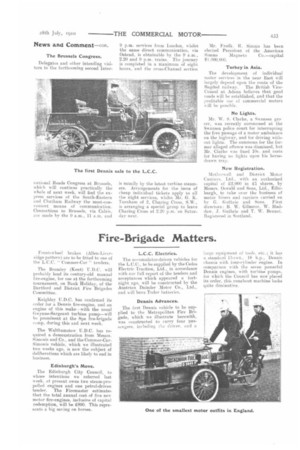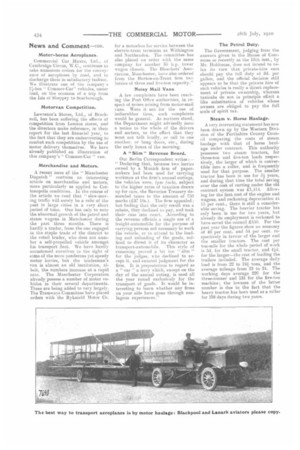Fire-Brigade Matters.
Page 11

Page 12

If you've noticed an error in this article please click here to report it so we can fix it.
L.C.C. Eleetries. Front-wheel brakes (Allen-Liversidge pattern) are to be fitted to one of the L.C.C. " Commer-Car " tenders, The Bromley (Kent) U.D.C. will probably lend its century-old manual fire-engine, for use at the forthcoming tournament, on Bank Holiday, of the Dartford and District Fire Brigades Committee.
Keighley has confirmed its
order for a Dennis fire-engine, and an engine of this make—with the usual Gwynne-Sargeant turbine pump—will he prominent at the Spa fire-brigade camp, during this and next week.
The Walthamstow U.D.C. has required a demonstration from Messrs. Simonis and Co., and the Commer-CarSimonis vehicle, which we illustrated two weeks ago, is now the subject of deliberations which are likely to end in business.
Edinburgh's Move.
The Edinburgh City Council, to whose intentions we referred last week, at present owns two steam-propelled engines and one petrol-driven tender. The Firemaster estimates that the total annual cost of five new motor fire-engines, inclusive of capital redemption, will be £890. This represents a big saving on horses. The aeettmulator-driven vehicles for the L.C.C., to be supplied by the Cedes Electric Traction, Ltd., in accordance with our full report of the tenders and acceptances which appeared a fortnight ago, will be constructed by the Austrian Daimler Motor Co., Ltd., and will have Tudor batteries.
Dennis Advances.
The first Dennis vehicle to be supplied to the Metropolitan Fire Brigade, which we illustrate herewith, was constructed to carry four passengers, incinding the driver. rod a large equipment of tools, etc. ; it has a standard 15-cwt., IS h.p., Dennis chassis with four-cylinder engine. In comparison with the seven powerful Dennis engines, with turbine pumps, for which the Council has now placed its order, this runabout machine looks uite diminutive. Motor-borne Aeroplanes.
Commercial Car hirers, Ltd., of Cambridge Circus, W.C., continues to take numerous orders for the conveyance of aeroplanes by road, and to discharge them in satisfactory fashion. We illustrate one of the company s " Commer-Car" vehicles, under load, on the occasion of a trip from the Isle of Sheppey to Scarborough.
Motorvan Competition.
Lawrence's Stores, Ltd., of Bracknell, has been suffering the effects of competition from Lonuon stores, and the directors make reference, in their report for the last financial year, to the fact that they are endeavouring to combat such competition by the use of motor delivery themselves. We have already published an illustration of this company's " Commer-Car " van.
Merchandise and Motors.
A recent issue of the " Manchester Dispatch" contains an interesting article on merchandise and motors, more particularly as applied to Cottonopolis conditions. In the course of the article we read that " slow-moving traffic will surely be a relic of the past in large cities in a very short period of time. One has only to note the abnormal growth of the petrol and steam wagons in Manchester during the past three months. There is hardly a trader, from the one engaged in the staple trade of the district to the retail trader, who does not number a self-propelled vehicle amongst his transport fleet. We have hardly accustomed ourselves to the sight of some of the more ponderous yet speedy motor lorries, but the tradesman's van is almost an old institution, albeit, the numbers increase at a rapid rate. The Manchester Corporation already possess a number of motor vehicles in their several departments. These are being added to very largely. The Tramways Committee have placed orders with the Ityknield Motor Co. for a motorbus for service between the electric-tram terminus at Withington and Northenden. The committee has also placed an order with the same company for another 35 11.p. tower wagon chassis. The Bleachers ASSOciat,iun, Manchester, have also ordered from the Burton-on-Trent firm two lorries of three and five-ton capacity."
Noisy Mail Vans.
A few complaints have been reaching the Post Office authorities, in respect of noises arising from motor-mail vans. Were it not for the use of indiarubber tires, such complaints would be general. As matters stand, the Department might advisedly issue a notice to the whole of the drivers and sorters, to the effect that they must not talk loudly, or call to one another, or bang doors, etc., during the early hours of the morning.
A "Slim" Revenue Board.
Our Berlin Correspondent writes:— " Declaring that, because two lorries owned by a Munich firm of papermakers had been used for carrying workmen at the firm's annual outings, the vehicles were, ipso facto, subject to the higher rates of taxation drawn up for cars, the Bavarian Treasury demanded taxes to the amount of 750 marks (L37 10s.). The firm appealed ; but finding that the only result was a rebate, they declined to pay, and took their case into court. According to the revenue officials a single use of a freight-automobile for the purpose of carrying persons not necessary to work the vehicle, or to attend to the loading and unloading of the goods, sufficed to divest it• of its character as transport-automobile. This style of reasoning proved a hit too " slim " for the judges, who declined to accept it, and entered judgment for the firm. It is preposterous to regard as
" car " a lorry which, except on the day of the annual outing, is used all the year round exclusively for the transport of goods. It would be interesting to learn whether any firms on your side have gone through analagous experiences. The Petrol Duty.
The Government, judging from the answers given in the house of Commons so recently as the 13th inst., by Mr. Hobhouse, does not intend to relax its view that private-hire cars should pay the full duty of 3d. per gallon, and the official -decision still appears to be that the private hire of such vehicles is really a direct replacement of private ownership, whereas taxicabs do not in principle effect a like substitution of vehicles whose owners are obliged to pay the full scale of spirit tax.
Steam v. Horse Haulage.
A very interesting statement has now been drawn up by the Western Division of the Perthshire County Council comparing the costs of steam haulage with that of horse haulage under contract. This authority possesses two steam tractors, for three-ton and five-ton loads respectively, the larger of which is convertible into a roller, and is frequently used for that purpose. The smaller tractor has been in use for 51 years, and during that time the total saving over the cost of carting under the old contract system was £1,414. Allowing for the first cost of the engine and wagons, and reckoning depreciation at 15 per cent., there is still a considerable saving. The heavier tractor has only been in use for two years but already its employment is reckoned to have saved the council 4450. For the past year the figures show an economy of 46 per cent. and 54 per cent. respectively in favour of the larger and the smaller tractors. The cost per ton-mile for the whole period of work is 5d. for the small tractor, and 4.4d. for the larger—the cost of loading the trailers included. The average daily load is from 22 to 24i tons, and the average mileage from 23 to 24. The working days average 226 for the three-tonner and 131 for the five-ton machine; the lowness of the latter number is due to the fact that the heavy tractor has been used as a roller for 198 days during two years.




















